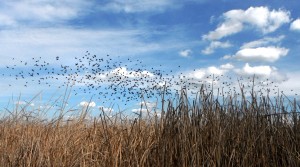
Farmers who have tricolored blackbirds nesting in their fields may be eligible for financial assistance from USDA’s Natural Resources Conservation Service (NRCS) to delay harvesting and allow the birds 35 days to fledge their young. Interested producers have until May 2 to apply for this funding.
“This is a unique approach but one that has been shown to work,” says Carlos Suarez, NRCS state conservationist for California. “Our goal is to work with our partners to create a strong incentive for farmers to voluntarily help these birds recover.”
Every spring, tricolored blackbirds build large colonies of nests in the Central Valley areas that were once marshy ecosystems and are now cropland. About 43% of the birds now use silage crops such as triticale and wheat to build their nests. Usually, the winter-planted crops are harvested before the birds have fledged, resulting in great declines in the tricolored blackbird populations.
The species is federally listed as a Bird of Conservation Concern, a California State Species of Special Concern, and also protected under the provisions of the Migratory Bird Treaty Act.
Tricolored blackbirds may choose different fields in different years and only farmers in Fresno, Kern, Kings, Madera, Merced, Riverside, Stanislaus, and Tulare counties, who actually have tricolored blackbirds on their property in a winter silage crop, are eligible to participate.
“You never know for sure where the birds will decide to nest in a given year,” said Jesse Bahm and Keiller Kyle, a team of biologists with NRCS and Audubon respectively. “Tricolored blackbirds are colonial nesters and when they choose a nesting area it can mean everything to the success of thousands of birds—but some headaches to the farmers who find themselves playing host to the colonies.”

Farmers with tricolored blackbirds can help the birds by delaying their harvesting until the young can fly away. Last year, the decision of six Tulare and Kern County farmers to delay their harvest schedule resulted in saving more than 65,000 rare tricolored blackbirds – one-fifth of the species’ entire global population. One Tulare farm had more than 30,000 tricolored birds. The birds all successfully fledged by the end of May.
In order to be considered eligible for financial assistance through the Environmental Quality Incentives Program, the applicant must have a vested interest in production agricultural and meet other program eligibility requirements.
This initiative is being coordinated through a partnership effort with Audubon California, and has the support of Valley ag organizations.
“Western United Dairymen members have once again partnered with NRCS and Audubon California to protect the tricolored blackbird,” said Paul Sousa, environmental director for Western United Dairymen. “This shows our members’ commitment to a sustainable ecosystem on and around their farms. This voluntary program benefits all parties as conservation is achieved in a way that allows farms to continue to be productive.”
The conservation organizations are working toward a long-term plan to eventually provide alternative nesting sites to the tricolored blackbirds that would be preferable to the farmers’ fields.
USDA’s Natural Resources Conservation Service helps America’s farmers and ranchers conserve the nation’s soil, water, air and other natural resources. All programs are voluntary and offer science-based solutions that benefit both the landowner and the environment. More information is available at www.ca.nrcs.usda.gov.
